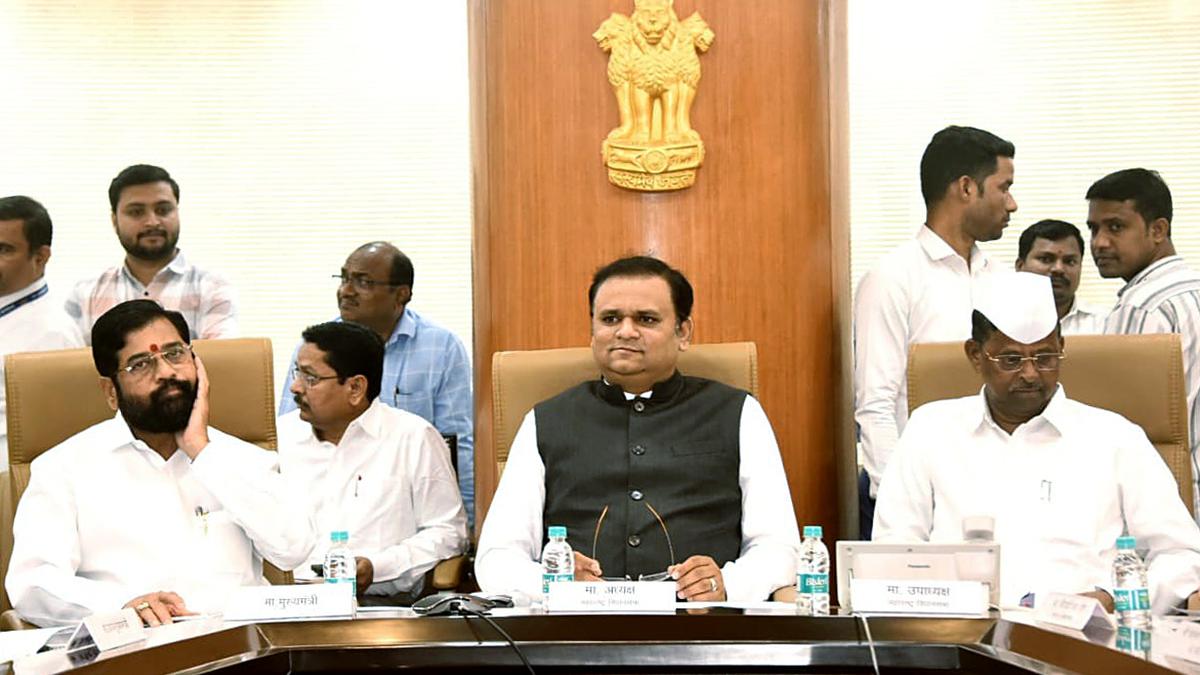
Amidst NCP split, Thackeray camp moves SC against Speaker for delaying disqualification hearings against Shinde
The Hindu
The petition, filed in the top court amidst the ongoing churn in Maharashtra politics following Ajit Pawar’s split from NCP to join the Shinde Cabinet as Deputy Chief Minister, said Speakers should “rise above their political affiliations” while performing the duties of the office.
The Uddhav Thackeray camp in the Supreme Court on July 4 accused Maharashtra Assembly Speaker Rahul Narwekar of deliberately delaying disqualification proceedings against Chief Minister Eknath Shinde for defection.
The petition, filed in the top court amidst the ongoing churn in Maharashtra politics following Ajit Pawar’s split from NCP to join the Shinde Cabinet as Deputy Chief Minister, said Speakers should “rise above their political affiliations” while performing the duties of the office.
The Thackeray faction said Mr. Narwekar’s conduct has been in “brazen disregard” of his constitutional duties as a neutral arbiter under the Tenth Schedule (anti-defection law) of the Constitution.
“It is imperative for this court to direct the Speaker to decide the disqualification petitions filed by the petitioner against delinquent members of the Maharashtra Legislative Assembly expeditiously and within a time-bound manner, or, alternatively, to decide the disqualification petitions itself,” a 406-page petition filed by Shiv Sena (UBT) leader Sunil Prabhu urged.
The Thackeray loyalists referred to the apex court’s own 2020 judgment in Keisham Meghachandra Singh v. Manipur Legislative Assembly, which had laid down that disqualification petitions under the Tenth Schedule should normally be decided within a period of three months from the date of their filing.
The petition said Mr. Narwekar’s inaction amounts to bias as it effectively permits Mr. Shinde’s illegal continuance in office when disqualification proceedings for defection are hanging over him. The Speaker’s conduct should be “perceptibly impartial” while exercising the powers of constitutional adjudication under the Tenth Schedule.
Mr. Prabhu, represented by advocates Amit Anand Tiwari and Nishant Patil, said the Supreme Court, in its May 11 judgment on the Thackeray-Shinde battle for control over Shiv Sena, had placed its trust in Mr. Narwekar to impartially hear and decide the anti-defection proceedings against the Mr. Shinde camp.

“Writing, in general, is a very solitary process,” says Yauvanika Chopra, Associate Director at The New India Foundation (NIF), which, earlier this year, announced the 12th edition of its NIF Book Fellowships for research and scholarship about Indian history after Independence. While authors, in general, are built for it, it can still get very lonely, says Chopra, pointing out that the fellowship’s community support is as valuable as the monetary benefits it offers. “There is a solid community of NIF fellows, trustees, language experts, jury members, all of whom are incredibly competent,” she says. “They really help make authors feel supported from manuscript to publication, so you never feel like you’re struggling through isolation.”

Several principals of government and private schools in Delhi on Tuesday said the Directorate of Education (DoE) circular from a day earlier, directing schools to conduct classes in ‘hybrid’ mode, had caused confusion regarding day-to-day operations as they did not know how many students would return to school from Wednesday and how would teachers instruct in two modes — online and in person — at once. The DoE circular on Monday had also stated that the option to “exercise online mode of education, wherever available, shall vest with the students and their guardians”. Several schoolteachers also expressed confusion regarding the DoE order. A government schoolteacher said he was unsure of how to cope with the resumption of physical classes, given that the order directing government offices to ensure that 50% of the employees work from home is still in place. On Monday, the Commission for Air Quality Management in the National Capital Region and Adjoining Areas (CAQM) had, on the orders of the Supreme Court, directed schools in Delhi-NCR to shift classes to the hybrid mode, following which the DoE had issued the circular. The court had urged the Centre’s pollution watchdog to consider restarting physical classes due to many students missing out on the mid-day meals and lacking the necessary means to attend classes online. The CAQM had, on November 20, asked schools in Delhi-NCR to shift to the online mode of teaching.









